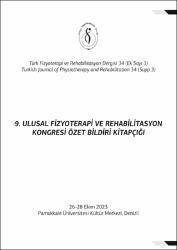Fizyoterapistlerde kas iskelet sistemi sorunlarının iş doyumu, uyku ve yaşam kalitesi üzerine etkisinin incelenmesi
Citation
Tuncer, D.; Usul, M.; Pehlivan, S.; Aydın, Y. Fizyoterapistlerde kas iskelet sistemi sorunlarının iş doyumu, uyku ve yaşam kalitesi üzerine etkisinin incelenmesi. 9. Ulusal Fizyoterapi ve Rehabilitasyon Kongresi/Yüz yüze/26-28 Ekim 2023/Denizli-Pamukkale Üniversitesi Prof. Dr. Hüseyin Yılmaz Kongre Kültür Merkezi.Abstract
Amaç: Bu çalışmanın amacı fizyoterapistlerde mevcut olan kas-iskelet
sistemi sorunlarının iş doyumuna, uyku kalitesine ve yaşam kalitesine
etkisini incelemektir.
Yöntem: Araştırmamıza aktif çalışan 86 fizyoterapist (63 kadın, 23
erkek) katılmıştır. Katılımcılara, Sosyodemografik Bilgi Formu, Nordic Kas-İskelet Sistemi-Anketi, Minnesota-İş-Doyum-Ölçeği, Pittsburg Uyku-Kalitesi-İndeksi ve Short-Form-36-Yaşam Kalitesi-Ölçeği Google
Forms aracılığıyla ulaştırılmıştır. Verilerin analizinde SPSS-20.0 istatistik
programı kullanılmıştır.
Sonuçlar: Çalışmamıza katılan fizyoterapistlerin Minnesota-İş-Doyum Ölçeği global skoru 45,01 idi. Nordic Kas-İskelet Sistemi Anketi global
skoru ve dokuz bölge için Minnesota-İş-Doyum Ölçeği global skoru
ve içsel-dışsal doyum parametreleri arasında anlamlı korelasyon
görülmemiştir (p>0,05). Nordic Kas-İskelet Sistemi Anketinin el-bileğinin
sorgulandığı parametre hariç Short Form-36’nın alt parametreleriyle
negatif yönlü korelasyon gösterdiği, Pittsburg-Uyku-Kalitesi-İndeksi
toplam skoru ile anketin dirsek (p=0,004; r=0,306), alt sırt (p=0,011;
r=0,272), diz (p=0,049; r=0,213) ve ayak bileği (p=0,029; r=0,235)
parametreleri arasında pozitif yönlü korelasyon görülmüştür.
Tartışma: Geçmiş araştırmaların, iş doyum ölçeğinden alınan puanı orta
(60 puan ve altı), orta ile tam memnun değil (61-79 puan) ve memnun
(80 puan ve üstü) olarak sınıflandırmasına dayanarak çalışmamıza
katılan fizyoterapistlerin memnuniyet düzeylerinin düşük olduğunu
söyleyebiliriz. Fizyoterapistlerde muskuloskeletal sistem sorunları
uyku ve yaşam kalitesini etkilemesine rağmen; iş doyumuna etkisinin
sonuçlarının daha fazla çalışmayla desteklenmesi gerekmektedir. Purpose: The aim of this study was to investigate the effect of
musculoskeletal problems on job satisfaction, sleep quality, and quality
of life in physiotherapists.
Methods: Total of 86 actively working physiotherapists (63 female, 23
male) participated in our study. Sociodemographic-Information-Form,
Nordic-Musculoskeletal-Questionnaire, Minnesota-Job-Satisfaction Scale, Pittsburg-Sleep-Quality-Index, and Short-Form-36-Quality of Life-Scale were sent to the participants via Google-Forms. The data were
analyzed using SPSS-20.0 statistical programme.
Results: The Minnesota-Job-Satisfaction-Scale global was 45.01. There
was no significant correlation between the global score of the Nordic-Musculoskeletal-Questionnaire and the global score of the Minnesota Job-Satisfaction-Scale for nine regions and the intrinsic-extrinsic
satisfaction parameters. There was negative correlation between the
Nordic-Musculoskeletal-Questionnaire and the sub-parameters of Short
Form-36 except for the wrist parameter, and positive correlation between
the Pittsburg-Sleep-Quality-Index total score and the elbow (p=0.004;
r=0.306), lower back (p=0.011; r=0.272), knee (p=0.049; r=0.213), ankle
(p=0.029; r=0.235) parameters.
Discussion: Based on the classification of the scores obtained from
the job satisfaction scale as moderate (60 points and below), moderate
to completely dissatisfied (61-79 points), satisfied (80 points and
above) in previous studies, we can say that the satisfaction levels of
the physiotherapists participating in our study are low. Although
musculoskeletal system problems affect sleep and quality of life in
physiotherapists, the results of the effect of musculoskeletal system
problems on job satisfaction should be supported by more studies.
Source
9. Ulusal Fizyoterapi ve Rehabilitasyon KongresiCollections
- Bildiri Koleksiyonu [12]


















